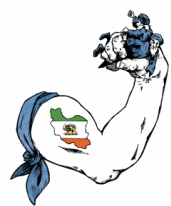By George Friedman
U.S. President George W. Bush now has made
it clear what his policy on Iraq will be for the immediate future, certainly
until Election Day: He does not intend to change U.S. policy in any
fundamental way. U.S. troops will continue to be deployed in Iraq, they will
continue to carry out counterinsurgency operations, and they will continue to
train Iraqi troops to eventually take over the operations. It is difficult to
imagine that Bush believes there will be any military solution to the
situation in Iraq; therefore, we must try to understand his reasoning in
maintaining this position. Certainly, it is not simply a political decision.
Opinion in the United States has turned against the war, and drawing down
U.S. forces and abandoning combat operations would appear to be the
politically expedient move. Thus, if it is not politics driving him -- and
assuming that the more lurid theories on the Internet concerning Bush's
motivations are as silly as they appear -- then we have to figure out what he
is doing.
Let's consider the military situation first. Bush has said
that there is no civil war in Iraq. This is in large measure a semantic
debate. In our view, it would be inaccurate to call what is going on a "civil
war" simply because that term implies a degree of coherence that simply does
not exist. Calling it a free-for-all would be more accurate. It is not simply
a conflict of Shi'i versus Sunni. The Sunnis and Shia are fighting each
other, and all of them are fighting American forces. It is not altogether
clear what the Americans are supposed to be doing.
Counterinsurgency
is unlike other warfare. In other warfare, the goal is to defeat an enemy
army, and civilian casualties as a result of military operations are expected
and acceptable. With counterinsurgency operations in populated areas,
however, the goal is to distinguish the insurgents from civilians and destroy
them, with minimal civilian casualties. Counterinsurgency in populated areas
is more akin to police operations than to military operations; U.S. troops
are simultaneously engaging an enemy force while trying to protect the
population from both that force and U.S. operations. Add to this the fact
that the population is frequently friendly to the insurgents and hostile to
the Americans, and the difficulty of the undertaking becomes
clear.
Consider the following numbers. The New York Police Department
(excluding transit and park police) counts one policeman for every 216
residents. In Iraq, there is one U.S. soldier (not counting other coalition
troops) per about 185 people. Thus, numerically speaking, U.S. forces are in
a mildly better position than New York City cops -- but then, except for
occasional Saturday nights, New York cops are not facing anything like the
U.S. military is facing in Iraq. Given that the United States is facing not
one enemy but a series of enemy organizations -- many fighting each other as
well as the Americans -- and that the American goal is to defeat these while
defending the populace, it is obvious even from these very simplistic numbers
that the U.S. force simply isn't there to impose a settlement.
Expectations and a Deal Unwound
A military solution to
the U.S. dilemma has not been in the cards for several years. The purpose of
military operations was to set the stage for political negotiations. But the
Americans had entered Iraq with certain expectations. For one thing, they had
believed they would simply be embraced by Iraq's Shiite population. They also
had expected the Sunnis to submit to what appeared to be overwhelming
political force. What happened was very different. First, the Shia welcomed
the fall of Saddam Hussein, but they hardly embraced the Americans -- they
sought instead to translate the U.S. victory over Hussein into a Shiite
government. Second, the Sunnis, in view of the U.S.-Shiite coalition and the
dismemberment of the Sunni-dominated Iraqi Army, saw that they were about to
be squeezed out of the political system and potentially crushed by the Shia.
They saw an insurgency -- which had been planned by Hussein -- as their only
hope of forcing a redefinition of Iraqi politics. The Americans realized that
their expectations had not been realistic.
Thus, the Americans went
through a series of political cycles. First, they sided with the Shia as they
sought to find their balance militarily facing the Sunnis. When they felt
they had traction against the Sunnis, following the capture of Hussein -- and
fearing Shiite hegemony -- they shifted toward a position between Sunnis and
Shia. As military operations were waged in the background, complex
repositioning occurred on all sides, with the Americans trying to hold the
swing position between Sunnis and Shia.
The process of creating a
government for Iraq was encapsulated in this multi-sided maneuvering. By
spring 2006, the Sunnis appeared to have committed themselves to the
political process. And in June,
with the death of Abu Musab al-Zarqawi and the announcement that
the United States would reduce its force
in Iraq by two brigades, the stage seemed to be set for a
political resolution that would create a Shiite-dominated coalition that
included Sunnis and Kurds. It appeared to be a done deal -- and then the deal
completely collapsed.
The first sign of the collapse was a sudden
outbreak of fighting among Shia in
the Basra region. We assumed that this was political positioning among Shiite
factions as they prepared for a political settlement. Then Abdel Aziz
al-Hakim, the head of the Supreme Council for Islamic Revolution in Iraq
(SCIRI), traveled to Tehran, and Muqtada al-Sadr's Mehdi Army commenced an
offensive. Shiite death squads struck out at Sunni populations, and Sunni
insurgents struck back. From nearly having a political accommodation, the
situation in Iraq fell completely apart.
The key was Iran. The
Iranians had always wanted an Iraqi satellite state, as protection against
another Iraq-Iran war. That was a basic national security concept for them.
In order to have this, the Iranians needed an overwhelmingly Shiite-dominated
government in Baghdad, and to have overwhelming control of the Shia. It
seemed to us that there could be a Shiite-dominated government but not an
overwhelmingly Shiite government. In other words, Iraq could be neutral
toward, but not a satellite of, Iran. In our view, Iraq's leading Shia --
fearing a civil war and also being wary of domination by Iran -- would accept
this settlement.
We may have been correct on the sentiment of leading
Shia, but we were wrong about Iran's intentions. Tehran did not see a neutral
Iraq as being either in Iran's interests or necessary. Clearly, the Iranians
did not trust a neutral Iraq still under American occupation to remain
neutral. Second -- and this is the most important -- they saw the Americans
as militarily weak and incapable of either containing a civil war in Iraq or
of taking significant military action against Iran. In other words, the
Iranians didn't like the deal they had been offered, they felt that they
could do better, and they felt that the time had come to strike.
A
Two-Pronged Offensive
When we look back through Iranian eyes, we
can now see what they saw: a golden opportunity to deal the United States a
blow, redefine the geopolitics of the Persian Gulf and reposition the Shia in
the Muslim world. Iran had, for example, been revivifying Hezbollah in
Lebanon for several months. We had seen this as a routine response to the
withdrawal of Syrian troops from Lebanon. It is now apparent, however, that
it was part of a two-pronged offensive.
First, in Iraq, the Iranians
encouraged a variety of factions to both resist the newly formed government
and to strike out against the Sunnis. This created an uncontainable cycle of
violence that rendered the Iraqi government impotent and the Americans
irrelevant. The tempo of operations was now in the hands of those Shiite
groups among which the Iranians had extensive influence -- and this included
some of the leading Shiite parties, such as SCIRI.
Second, in Lebanon,
Iran encouraged Hezbollah to launch an offensive. There is debate over
whether the Israelis or Hezbollah ignited the conflict in Lebanon. Part of
this is ideological gibberish, but part of it concerns intention. It is clear
that Hezbollah was fully deployed for combat. Its positions were manned in
the south, and its rockets were ready. The capture of two Israeli soldiers
was intended to trigger Israeli airstrikes, which were as predictable as
sunrise, and Hezbollah was ready to fire on Haifa. Once Haifa was hit, Israel
floundered in trying to deploy troops (the Golani and Givati brigades were in
the south, near Gaza). This would not have been the case if the Israelis had
planned for war with Hezbollah. Now, this discussion has nothing to do with
who to blame for what. It has everything to do with the fact that Hezbollah
was ready to fight, triggered the fight, and came out ahead because it wasn't
defeated.
The end result is that, suddenly, the Iranians held the whip
hand in Iraq, had dealt Israel a psychological blow, had repositioned
themselves in the Muslim world and had generally redefined the dynamics of
the region. Moreover, they had moved to the threshold of redefining the
geopolitics to the Persian Gulf.
This was by far their most important
achievement.
A New Look at the Region
At this point,
except for the United States, Iran has by far the most powerful military
force in the Persian Gulf. This has nothing to do with its nuclear
capability, which is still years away from realization. Its ground forces are
simply more numerous and more capable than all the forces of the Arabian
Peninsula combined. There is another aspect to this: The countries of the
Arabian Peninsula are governed by Sunnis, but many are home to substantial
Shiite populations as well. Between the Iranian military and the possibility
of unrest among Shia in the region, the situation in Saudi Arabia and the
rest of the Peninsula is uneasy, to say the least. The rise of Hezbollah well
might psychologically empower the generally quiescent Shia to become more
assertive. This is one of the reasons that the Saudis were so angry at
Hezbollah, and why they now are so anxious over events in Iraq.
If
Iraq were to break into three regions, the southern region would be Shiite --
and the Iranians clearly believe that they could dominate southern Iraq. This
not only would give them control of the Basra oil fields, but also would
theoretically open the road to Kuwait and Saudi Arabia. From a strictly
military point of view, and not including the Shiite insurgencies at all,
Iran could move far down the western littoral of the Persian Gulf if American
forces were absent. Put another way, there would be a possibility that the
Iranians could seize control of the bulk of the region's oil reserves. They
could do the same thing if Iraq were to be united as an Iranian satellite,
but that would be far more difficult to achieve and would require active U.S.
cooperation in withdrawing.
We can now see why Bush cannot begin
withdrawing forces. If he did that, the entire region would destabilize. The
countries of the Arabian Peninsula, seeing the withdrawal, would realize that
the Iranians were now the dominant power. Shia in the Gulf region might act,
or they might simply wait until the Americans had withdrawn and the Iranians
arrived. Israel, shaken to the core by its fight with Hezbollah, would have
neither the force nor the inclination to act. Therefore, the United States
has little choice, from Bush's perspective, but to remain in Iraq.
The
Iranians undoubtedly anticipated this response. They have planned carefully.
They are therefore shifting their rhetoric somewhat to be more accommodating.
They understand that to get the United States out of Iraq -- and out of
Kuwait --they will have to engage in a complex set of negotiations. They will
promise anything -- but in the end, they will be the largest military force
in the region, and nothing else matters. Ultimately, they are counting on the
Americans to be sufficiently exhausted by their experience of Iraq to
rationalize their withdrawal -- leaving, as in Vietnam, a graceful interval
for what follows.
Options
Iran will do everything it
can, of course, to assure that the Americans are as exhausted as possible.
The Iranians have no incentive to allow the chaos to wind down, until at
least a political settlement with the United States is achieved. The United
States cannot permit Iranian hegemony over the Persian Gulf, nor can it
sustain its forces in Iraq indefinitely under these circumstances.
The United States has four choices, apart from the status
quo:
1. Reach a political accommodation that cedes the status of
regional hegemon to Iran, and withdraw from Iraq.
2. Withdraw forces
from Iraq and maintain a presence in Kuwait and Saudi Arabia -- something the
Saudis would hate but would have little choice about -- while remembering
that an American military presence is highly offensive to many Muslims and
was a significant factor in the rise of al Qaeda.
3. Halt
counterinsurgency operations in Iraq and redeploy its forces in the south
(west of Kuwait), to block any Iranian moves in the region.
4. Assume
that Iran relies solely on its psychological pre-eminence to force a regional
realignment and, thus, use Sunni proxies such as Saudi Arabia and Kuwait in
attempts to outmaneuver Tehran.
None of these are attractive choices.
Each cedes much of Iraq to Shiite and Iranian power and represents some
degree of a psychological defeat for the United States, or else rests on a
risky assumption. While No. 3 might be the most attractive, it would leave
U.S. forces in highly exposed, dangerous and difficult-to-sustain postures.
Iran has set a clever trap, and the United States has walked into it.
Rather than a functioning government in Iraq, it has chaos and a triumphant
Shiite community. The Americans cannot contain the chaos, and they cannot
simply withdraw. Therefore, we can understand why Bush insists on holding his
position indefinitely. He has been maneuvered in such a manner that he -- or
a successor -- has no real alternatives.
There is one counter to
this: a massive American buildup, including a major buildup of ground forces
that requires a large expansion of the Army, geared for the invasion of Iran
and destruction of its military force. The idea that this could readily be
done through air power has evaporated, we would think, with the Israeli air
force's failure in Lebanon. An invasion of Iran would be enormously
expensive, take a very long time and create a problem of occupation that
would dwarf the problem faced in Iraq. But it is the other option. It would
stabilize the geopolitics of the Arabian Peninsula and drain American
military power for a generation.
Sometimes there are no good choices.
For the United States, the options are to negotiate a settlement that is
acceptable to Iran and live with the consequences, raise a massive army and
invade Iran, or live in the current twilight world between Iranian hegemony
and war with Iran. Bush appears to be choosing an indecisive twilight. Given
the options, it is understandable why.
Send questions or comments on this article to analysis@stratfor.com.
Was this forwarded to you? Sign up to start receiving your own copy – it’s always thought-provoking, insightful and free.
Go to https://www.stratfor.com/subscriptions/free-weekly-intelligence-reports.php to register
Iran: Redefining the Middle East?
We would like to bring to your attention a recent Stratfor update on the political struggles in Iraq, the complex power matrix in the Middle East and the role Iran has been playing in redefining the entire region.
With an increase in the militia incidents in Iraq and the ongoing Israel-Hezbollah conflict, you will find the Break Point: What Went Wrong analysis a timely, sobering review of:
- The escalation of sectarian violence in Iraq and its root causes
- The internal Shiite struggle and its resolution
- Iran's interests and motivations concerning Iraq and within the larger Arab world
- Why Iran is key to understanding both the crisis in Iraq and the Israel-Hezbollah conflict
Click here to download the report and find out how you can save $100 off regular Premium rates.
Distribution and Reprints
This report may be distributed or republished with attribution to Strategic Forecasting, Inc. at www.stratfor.com. For media requests, partnership opportunities, or commercial distribution or republication, please contact pr@stratfor.com.
Technorati Tags:Iraq***Iran***Bush
Linked to
| Post Comment | Permalink | Share This Post
Updated: Wednesday, 6 September 2006 7:24 PM CDT

















